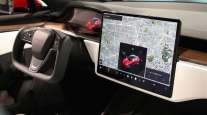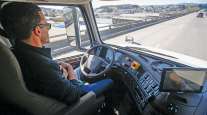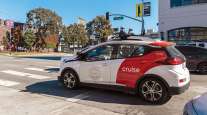Senior Reporter
Autonomous Technology Needs US Standards, Volvo Executive Tells Transportation Panel

This story appears in the July 13 print edition of Transport Topics.
WASHINGTON — For autonomous driving technologies to continue to advance, lawmakers will have to approve federal standards that address various regulations at the state level, a Volvo Group executive told a Senate transportation panel July 7.
“There are regulations regarding the allowable distance to follow a truck on public roadways that need to be changed to allow for further testing and demonstration,” Susan Alt, senior vice president of public affairs at Volvo Group, told the Senate Commerce Committee. “Clear, precise and thoughtful definitions must be provided.”
Alt added the company is interested in developing technologies for connected and automated driving because they have the potential for enhancing safety, environmental efficiency and productivity. Eventually, automated technology may significantly change the country’s traffic system and the way in which vehicles are designed, Alt said.
The regulatory certainty from Congress also would enable Volvo to continue working on rollout innovations such as multi-truck convoys, where vehicles drive closely behind one another. Alt said that, since 2009, Volvo has been testing platooning in Europe, generally with two trucks and three cars. She said at an event in May that platooning is a way to enhance safety and fuel economy without additional infrastructure investment.
“With these technologies in widespread use, we will be able to more efficiently use the available road space to increase mobility and transportation efficiency. This will truly support sustainable development in the face of growing population and transportation needs,” she said.
Alt has indicated the company would like to see the National Highway Traffic Safety Administration announce regulations addressing platooning, as well as other innovations.
NHTSA has indicated it is working to develop safety performance requirements for automated vehicles.
Volvo also supports legislation in California that would create the possibility of platooning, in part by altering existing tailgating laws. The bill has been referred to a committee.
Volvo Group owns Volvo Trucks and Mack Trucks, both based in Greensboro, North Carolina. Other truck makers, such as Freightliner and Peterbilt Motors also are advancing technologies to automate the movement of freight.
Around the industry, companies such as Amazon.com and BNSF Railway are utilizing automated tools as well. Executives from those companies told senators that Congress needed to establish rules that do away with inconsistent state-level regulations. Doing so would help transportation technologies such as aerial drones and self-driving cars to advance nationally.
“Drone deliveries not only require innovative aviation technologies and government approvals but also meeting logistical challenges within our warehouses,” said Paul Misener, vice president for global public policy at Amazon.com.
Gregory Fox, executive vice president of operations at BNSF Railway, said the rail industry will continue to deploy technology in support of risk reduction, and “ensuring railroads can continue to earn the revenues necessary to invest adequately in infrastructure, maintenance and technology will be one of the most significant things that Congress can do.”
Sen. Deb Fischer (R-Neb.), chairwoman of the Senate Commerce, Science and Transportation Subcommittee on Surface Transportation and Merchant Marine Infrastructure, Safety and Security, noted that technology “is changing our world, especially in the way businesses transport their products.”
“By offering new ways to deliver goods to market, innovators are making our transportation system safer and our economy more efficient for consumers and families. At the same time, our policies must keep pace with these rapid advancements and adapt to outdated regulations that harm growth,” Fischer said.
“The federal government can be a key player in helping to utilize and advance” these tools, added Sen. Cory Booker of New Jersey, the subcommittee’s ranking Democrat.
Transportation authorizers on the Commerce panel are expected to consider proposals this month designed to advance certain autonomous, or smart, technologies for commercial vehicles.




